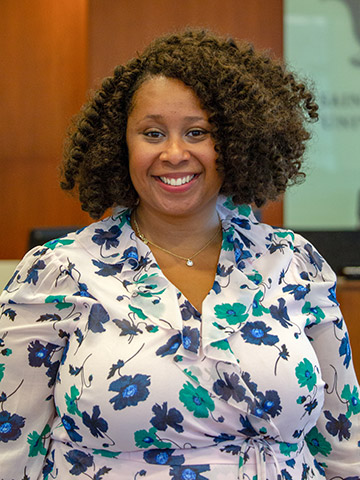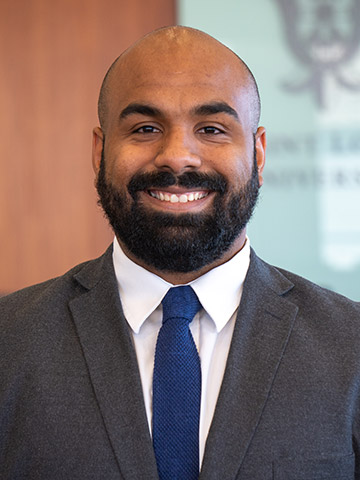SLU LAW Expands Pipeline Initiatives with Accessing the Legal Profession Mini-Camp
This past June, SLU LAW offered a new virtual program for college students from underrepresented backgrounds who are interested in law. The Accessing the Legal Profession (ALP) Admissions Application Mini-Camp aimed to provide them tools to overcome barriers they may face on their path to law school.
Hosted by a joint office committee comprised of Belinda Dantley ('13), Aly Ricci ('15) and Jean Pierre Bonnet-Laboy ('18), the five days of programming included detailed information sessions on every step of the law school application process, including the resume, the personal and diversity statements and how to finance the process.
More than 360 students registered to attend. Over the course of the week, the program averaged more than 100 attendees per day, with just over 70 individuals attending all five sessions. The attendees hailed from 26 different states, as well as Canada, Ghana, and Trinidad & Tobago.

Dantley, SLU LAW’s assistant dean of diversity, equity and inclusion, says that while there are many existing programs focusing on the LSAT and on the legal profession, there is less focus on the actual application: “really the one thing that’s going to get you into law school.”
“I do work on first-generation programming for our incoming students, which has showed us that the gap in knowledge starts way before [the LSAT],” she said. “This was our way of going back in time and reaching people earlier in the process.”
“This mini-camp was created based on our commitment to discover new ways to provide crucial information to applicants across the country,” said Bonnet-Laboy, assistant director in the Office of Admissions. “It was intentionally designed to address long-standing educational gaps for those from underrepresented backgrounds who are interested in attending law school.”
“Not all students have the same resources and cultural capital to have someone review their application or explain the importance of certain parts of the application,” Dantley said. “And because of that, we miss out on amazing people coming to law school.”
Both Dantley and Bonnet-Laboy said that their favorite aspect of the program was seeing the engagement from attendees in the question-and-answer section, noting that they may not have had the opportunity to ask such questions in any other setting.

“The feedback from the program really showed how many individuals didn’t know that amount of impact a personal statement can have on an application,” Bonnet-Laboy said. “It was enlightening to see how this program was able to provide much needed information regarding the role personal statements play in admissions.”
Dantley believes that the program shows participants that SLU LAW is invested in their futures even before they get here.
“The resounding theme we heard was ‘Law school and the legal community say that diversity is important and that they want students from underrepresented backgrounds, but then don’t offer that access or those resources to make that a realistic possibility,’” she said. “This was something that SLU LAW did that showed we recognized: one – that there’s a problem, and two – here’s a resource to help combat that problem.
Even if they don’t come here, I delight in knowing that we are helping to diversify the legal community.”
Belinda Dantley ('13)
“The legal profession hasn’t changed [in representation] in 10 years,” Dantley continued. “So even if they don’t come here, I delight in knowing that we are helping to diversify the legal community.”
Dantley says that while all the participants may have applied for law school with or without this program, they will present a better application, get higher scholarships and go to better schools as a result of its lessons. The program was such a success that the committee even hosted a special follow-up program focused on resources for LSAT preparation since they did receive some related questions.
“There were so many resources discussed in that session that I didn’t even know existed,” Dantley said. “If I am someone who has gone to law school, is licensed, am working at the law school and didn’t know these existed, I know there are many students who didn’t know about it, and now they do.”
Dantley credited alumnus Joe Bartholomew (’84) with making a generous donation that created the fund to host this program. She also noted the contributions of many SLU LAW staff and faculty members – most of whom are also alumni – who helped make the program a success.
“As a society we say that diversity, equity and inclusion initiatives should be collaborative, but they tend to fall on one person or a small group of people who continually do the work over and over again,” she said. “This genuinely showed that it was across offices and across departments. There were even more people interested in participating; we just didn’t have enough days to include them in the program!”
Student feedback was overwhelmingly positive, with many commenting on the friendliness and positivity of SLU LAW’s presenters.
“It was nice to see law professors coming out and supporting future scholars with such good energy,” one participant said.
“I loved being able to ask questions in real-time as they came to my mind – even if the question was a little more specific to my situation,” said another. “It was helpful to be able to get a second opinion from experienced professionals.”
“This boot camp provided tremendously helpful information. Being a first-generation student, at times finding valuable resources can be hard, but SLU LAW’s mini-camp was able to provide all the information and questions I had.”
Other comments included:
- “It gave me the most thorough breakdown of all the steps required for a law school application I could have ever asked for.”
- “This was such an amazing opportunity. As someone who prepares excessively, I was very concerned about my complete lack of knowledge for applying to law school. I learned all of the basics and some wonderful tips and tricks to best show who I am and why I am the right applicant.”
- “The resume and diversity statement days were great. Most webinars or information session I've been to rarely went so in-depth with those topics.”
- “I like that the speakers were upfront about what impression you make in your application. Sometimes we forget that someone who doesn't know us has to read what we write and make an assessment from there.”
- “It made me realize what I did and did not know and forced me to plan out what I had to do and when I had to do it. The process was overwhelming and intimidating to me at first, but having it broken down in concrete sections made the process seem more manageable.”
- “This camp answered all the questions I could possibly have had. I appreciate y’all so much! I feel so much more confident and prepared going into this admission cycle.”
“A mantra that this committee operates by is ‘You belong here,’ and this program reached hundreds of individuals from diverse backgrounds to reaffirm that they belong in the legal profession and their presence improves the profession as a whole,” Bonnet-Laboy said.
“As a proud first-generation American, first-generation lawyer and SLU LAW alumnus, the investment in this program from such a wide array of SLU LAW faculty and staff reaffirmed that this community truly cares about its commitment to diversity, equity and inclusion. This program demonstrates that SLU LAW is willing and able to take action to bring in more diverse perspectives and backgrounds to the legal community. It fills me with pride to see the impact that the Accessing the Legal Profession Pipeline Program can create.”